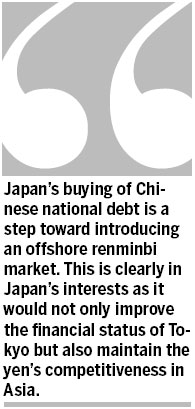 |
|
|
|
|||||||||||

China and Japan face common challenge from depreciation of US currency and are internationalizing their own
Japan announced recently that it has obtained permission from China to buy 65 billion?yuan ($10.3 billion) of Chinese government bonds and will seek to set up an offshore renminbi-trading center in Tokyo, signaling its support for renminbi internationalization.
The agreement for Japan to buy Chinese government bonds is a result of the bilateral consensus reached between the two countries at the end of last year during the visit of Japanese Prime Minister Yoshihiko Noda to China. During Japanese Finance Minister Jun Azumi's visit to Beijing last month, a new consensus was reached on bilateral financial cooperation, such as establishing an offshore renminbi market and promoting direct trading of the renminbi and the yen.
Given that Japan started internationalizing its government bonds early, China does not need approval from Japan and already owns Japanese government bonds as part of its foreign exchange reserves.
China and Japan have become increasingly economically interdependent over the past decade. Japan has been China's major source of foreign direct investment for years, and China replaced the United States as Japan's largest source of imports in 2002 and replaced the US in 2009 as Japan's largest export destination.
The changing China-Japan trade structure has accelerated the upgrading of the industrial structure of both countries and further deepened their interdependence. Being the two largest US debt holders, China and Japan are facing common challenges derived from the depreciation of dollar in the current dollar-dominated international monetary system.
Therefore the two countries share a common interest in lowering their currency risk by supporting each other's currency internationalization and promoting direct exchange of the renminbi and the yen to diversify their huge foreign exchange reserves.
In fact, Japan began to consider internationalizing the yen in the mid-1980s amid its rapidly increasing trade surplus with the US. The birth of euro in 1999 and the financial crisis in East Asia spurred Japan to renew its efforts to internationalize the yen to adapt to the changes in the global economy and financial system by promoting yen settlement in cross-border trade in Asia. Thus further establishing the yen's role in the international monetary system alongside the dollar and the euro.
Now, more and more Japanese enterprises are turning to renminbi settlement for cross-border trade to reduce their currency risk. Japan's three largest banks recorded an expanding renminbi transaction volume of 150 billion yen in the 2011 fiscal year, five times the size of the previous fiscal year.
Currency internationalization reflects a country's comprehensive national strength and is based on the building of the financial capital market. China launched a pilot program in 2009 allowing companies in first-tier cities to use the renminbi as an option to settle international trade deals and after its expansion in 2010 it is now due to be rolled out nationwide. In February, the central bank announced a three-step plan for the next 10 years, which will loosen capital control and give the renminbi more global clout.
The Chinese government designated the Hong Kong Special Administrative Region as a center for the offshore renminbi market in 2009, and offshore renminbi deposits have increased dramatically since then, from barely $100 billion in 2009 to $627 billion by November 2011. Offshore renminbi trading remains vibrant, and the United Kingdom and Singapore are seeking to team up with Hong Kong to become offshore trading centers for the renminbi.
Not surprisingly, Japan also has its eye on renminbi-denominated business, and its buying of Chinese national debt is a step toward introducing an offshore renminbi market. This is clearly in Japan's interests as it would not only improve the financial status of Tokyo but also maintain the yen's competitiveness in Asia.
The author is a research scholar with the China Institute of Contemporary International Relations.